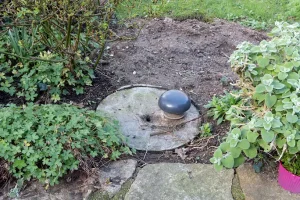
A septic system is responsible for controlling and managing the wastewater in your home. Anything you flush or send down a drain line will eventually end up in your septic tank if you have one.
“How can I locate my septic tank?” is often requested. Every septic tank fills up and needs to be pumped. You may not know where your tank’s lid is located. What is the depth of a septic tank lid?
How To Locate Your Septic Tank
Your septic tank’s location is not a secret. There will be a means for you to locate it and note its location for future reference, and here are a few options.
First and foremost, consult a map. Using a map is frequently the simplest approach. Most counties keep septic tank installation records for all addresses. These maps should include schematics and dimensions that illustrate the exact placement of the tank on the land so that you can measure and locate it. Remember that landmarks may vary over time depending on when the tank was constructed, so don’t rule out a spot just because there are a few more shrubs or a tree nearby.
This map should be included with your home inspection paperwork if you just purchased a property.
Inspect Your Yard
Septic tanks are designed to blend in as much as possible. It’s sometimes difficult to detect the visual indicators where your septic tank was put after time. However, this does not rule out the possibility of finding indications of your septic tank’s location.
- Under the driveway or another paved surface.
- Right against the house (the tank needs to be at least five feet away).
- Next to your well (if you have one).
- Near trees or areas with heavy plantings.
- Under a patio, deck, or another structure.
Consult Your Neighbors
If your neighbors have septic systems, they can assist you in locating your tank. Inquire your neighbors about the location of their septic tanks with respect to their homes. Talking to your neighbors about septic systems can serve as a friendly introduction to the rest of your community as well as a means to figure out where yours is.
After You’ve Found Your Septic Tank, What Should You Do?
It’s time to bring in the experts once you’ve found your tank. Trust us when we say that opening a septic tank is not something that most people want to do. Concrete septic tank lids are extremely heavy and must be removed using special lifting equipment. Because the contents are poisonous, please follow our instructions and do not attempt to open the tank yourself. Anyone wandering by your property could be in danger from an uncovered septic tank, and if someone falls in, the toxicity could be fatal.
Maintain Your Septic Tank
You can save hundreds of dollars by properly maintaining your tank. Maintaining your system may cost a few hundred dollars every few years, but that’s a lot less than the thousands of dollars it might cost to repair or replace a broken tank or septic system.
Using your drain pipes or toilets as garbage cans and using less water overall are two strategies to care for your septic tank and system. Paper towels, face wipes, and cat litter are items that should not be flushed. Solid meals, cooking oil, and pharmaceuticals should not be poured down the sink drain.
What To Do If You Need Help?
Maintenance of a septic system is not normally a do-it-yourself project. You should contact Top Tier Plumbing and Rooter if you need your septic tank pumped or cleaned or if you want to replace the tank at your house. If you’ve tried to locate your septic tank on your own and aren’t sure where it is, it may be time to seek our assistance.
Top Tier Plumbing and Rooter can find, maintain or replace your home’s septic tank. Whether you’re currently experiencing plumbing problems or want to be proactive about your home’s plumbing needs, contact us today by calling (951) 475-6521

